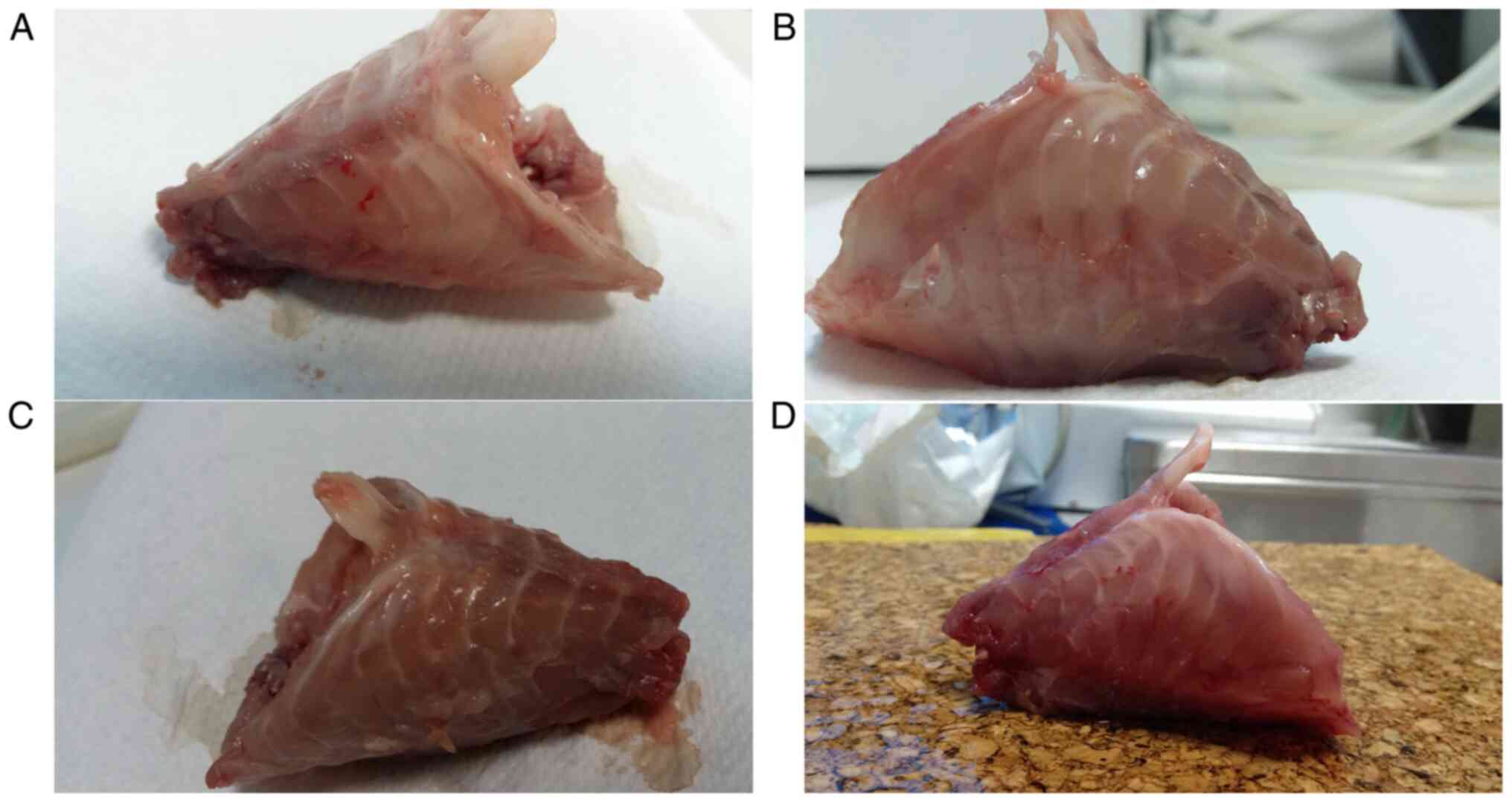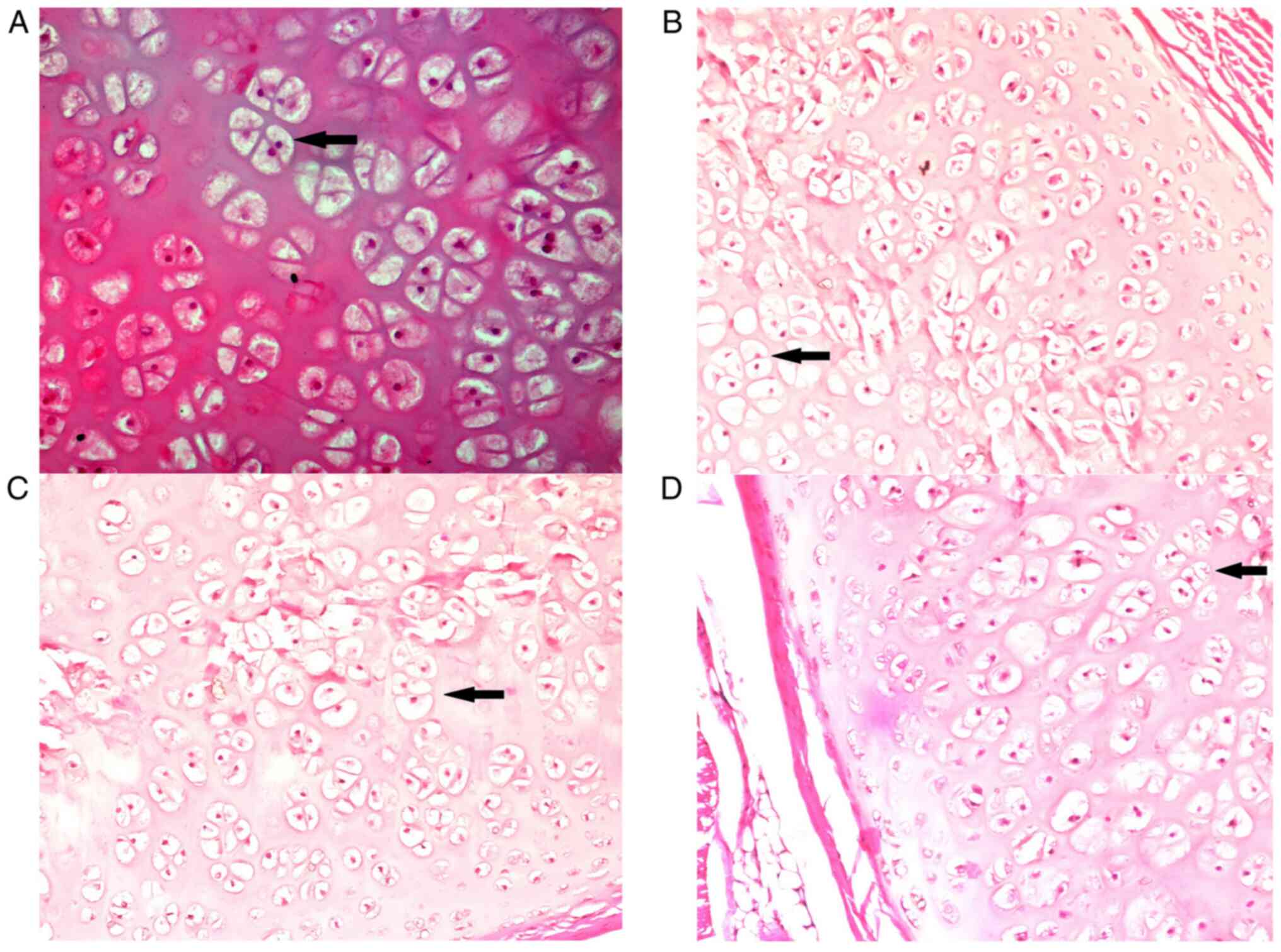|
1
|
Kurkov AV, Shekhter AB and Paukov VS:
Costal cartilage structural and functional changes in children with
a funnel or keeled chest. Arkh Patol. 79:57–62. 2017.PubMed/NCBI View Article : Google Scholar : (In Russian).
|
|
2
|
Nuss D, Obermeyer RJ and Kelly RE Jr:
Pectus excavatum from a pediatric surgeon's perspective. Ann
Cardiothorac Surg. 5:493–500. 2016.PubMed/NCBI View Article : Google Scholar
|
|
3
|
Brochhausen C, Turial S, Müller FK,
Schmitt VH, Coerdt W, Wihlm JM, Schier F and Kirkpatrick CJ: Pectus
excavatum: History, hypotheses and treatment options. Interact
Cardiovasc Thorac Surg. 14:801–806. 2012.PubMed/NCBI View Article : Google Scholar
|
|
4
|
Nicodin A, Boia ES, Popoiu MC, Cozma G,
Nicodin G, Badeti R, Trailescu M, Adam O and David VL: Preliminary
results after Nuss procedure. Chirurgia (Bucur). 105:203–210.
2010.PubMed/NCBI
|
|
5
|
David VL, Cerbu S, Haragus H, Popoiu MC,
Stanciulescu CM, Cozma G, Burlacu O and Boia ES: Costal cartilages
do not overgrow in patients with pectus excavatum. Med Princ Pract.
25:533–538. 2016.PubMed/NCBI View Article : Google Scholar
|
|
6
|
Nakaoka T, Uemura S, Yoshida T, Tanimoto T
and Miyake H: Overgrowth of costal cartilage is not the etiology of
pectus excavatum. J Pediatr Surg. 45:2015–2018. 2010.PubMed/NCBI View Article : Google Scholar
|
|
7
|
Dupont J and Holzenberger M: Biology of
insulin-like growth factors in development. Birth Defects Res C
Embryo Today. 69:257–271. 2003.PubMed/NCBI View Article : Google Scholar
|
|
8
|
Johns DE and Athanasiou KA: Growth factor
effects on costal chondrocytes for tissue engineering
fibrocartilage. Cell Tissue Res. 333:439–447. 2008.PubMed/NCBI View Article : Google Scholar
|
|
9
|
Jones JI and Clemmons DR: Insulin-like
growth factors and their binding proteins: Biological actions.
Endocr Rev. 16:3–34. 1995.PubMed/NCBI View Article : Google Scholar
|
|
10
|
Chitnis MM, Yuen JS, Protheroe AS, Pollak
M and Macaulay VM: The type 1 insulin-like growth factor receptor
pathway. Clin Cancer Res. 14:6364–6370. 2008.PubMed/NCBI View Article : Google Scholar
|
|
11
|
Kilkenny C, Browne W, Cuthill IC, Emerson
M and Altman DG: NC3Rs Reporting Guidelines Working Group. Animal
research: Reporting in vivo experiments: The ARRIVE guidelines. Br
J Pharmacol. 160:1577–1579. 2010.PubMed/NCBI View Article : Google Scholar
|
|
12
|
Schmidt MB, Chen EH and Lynch SE: A review
of the effects of insulin-like growth factor and platelet derived
growth factor on in vivo cartilage healing and repair.
Osteoarthritis Cartilage. 14:403–412. 2006.PubMed/NCBI View Article : Google Scholar
|
|
13
|
American Veterinary Medical Association
(AVMA): AVMA guidelines for the euthanasia of animals. 2020
Edition. AVMA, Schaumburg, IL, 2020. https://www.avma.org/sites/default/files/2020-01/2020-Euthanasia-Final-1-17-20.pdf.
Accessed November 10, 2021.
|
|
14
|
Hackam Lab for Pediatric Surgical,
Translational and Regenerative Medicine: Hackam Lab, H&E
staining (regressive method). Johns Hopkins Medicine, Baltimore,
MD, 2021. https://www.hopkinsmedicine.org/pediatricsurgery/research/hackam_lab/documents/hopkins_hackam_lab_protocols_h_e_regressive_method_staining.pdf.
Accessed December 2, 2021.
|
|
15
|
David VL, Ciornei B, Horhat FG, Amaricai
E, Horhat DI, Hoinoiu T and Boia ES: Rat Animal Model of Pectus
Excavatum. Life-Basel. 10(96)2020.PubMed/NCBI View Article : Google Scholar
|
|
16
|
Rahal SC, Morishin Filho MM, Hatschbach E,
Machado VM, Aptekmann KP and Corrêa TP: Pectus excavatum in two
littermate dogs. Can Vet J. 49:880–884. 2008.PubMed/NCBI
|
|
17
|
Darling EM and Athanasiou KA: Growth
factor impact on articular cartilage subpopulations. Cell Tissue
Res. 322:463–473. 2005.PubMed/NCBI View Article : Google Scholar
|
|
18
|
Goretsky MJ, Kelly RE Jr, Croitoru D and
Nuss D: Chest wall anomalies: Pectus excavatum and pectus
carinatum. Adolesc Med Clin. 15:455–471. 2004.PubMed/NCBI View Article : Google Scholar
|
|
19
|
Feng J, Hu T, Liu W, Zhang S, Tang Y, Chen
R, Jiang X and Wei F: The biomechanical, morphologic, and
histochemical properties of the costal cartilages in children with
pectus excavatum. J Pediatr Surg. 36:1770–1776. 2001.PubMed/NCBI View Article : Google Scholar
|
|
20
|
David VL, Izvernariu DA, Popoiu CM, Puiu M
and Boia ES: Morphologic, morphometrical and histochemical
proprieties of the costal cartilage in children with pectus
excavatum. Rom J Morphol Embryol. 52:625–629. 2011.PubMed/NCBI
|
|
21
|
Giem RN, Paulsen GA and Dykes J: Pectus
deformities. Calif Med. 94:306–309. 1961.PubMed/NCBI
|
|
22
|
Lester CW: The etiology and pathogenesis
of funnel chest, pigeon breast, and related deformities of the
anterior chest wall. J Thorac Surg. 34:1–10. 1957.PubMed/NCBI
|
|
23
|
Kurkov AV, Paukov VS, Fayzullin AL and
Shekhter AB: Costal cartilage changes in children with pectus
excavatum and pectus carinatum. Arkh Patol. 80:8–15.
2018.PubMed/NCBI View Article : Google Scholar : (In Russian).
|
|
24
|
Tocchioni F, Ghionzoli M, Calosi L, Guasti
D, Romagnoli P and Messineo A: Rib cartilage characterization in
patients affected by pectus excavatum. Anat Rec (Hoboken).
296:1813–1820. 2013.PubMed/NCBI View
Article : Google Scholar
|
















